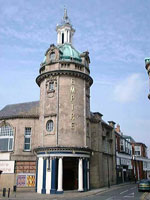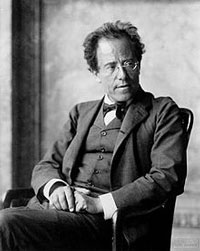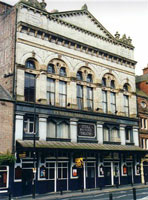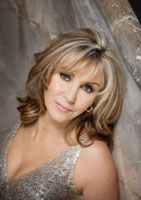My Musical Fahrt
( From Pop, Blues & Rock Music ... to Opera! )
Foreword:
Opera has a poor image with many people - elitism; huge singers screaming at the top of their voices while masquerading as young lovers; hours of boredom punctuated
by too few melodies; audiences turning up to be seen, rather than to enjoy the performance; etc. etc.
Well, I know next to nothing about music - apart from whether I like it, or not - but I do know one thing, with a couple of glasses of vin rouge, an Islay nightcap or two, and one
of my favourite Opera DVDs, I'm set for a wonderful evening. Comedy or tragedy, it doesn't matter, I love it.
Yes, lots of operas are absolute rubbish, but dozens of others range from great entertainment to sensational works of art. If you like classical music, why not think about
taking the next step? After all, an opera DVD can be as inexpensive as £10 to £20. Recommendations later.

Sunderland Empire
My First Opera
I saw my first opera at The Sunderland Empire in the late 1960s - Rossini's Barber of Seville. At that time my musical tastes were inclined towards Blues and Rock Music - people like John Mayall and The Stones; later Heavy Metal from Black Sabbath, Rush and AC/DC. My classical music knowledge was limited to records played at school by our music teacher, Miss Walton (stuff like Grieg's In the Hall of the Mountain King and Mozart's Eine Kleine Nachtmusik), popular classics on the radio, and my dad's one and only classical record, an EP of Rossini overtures. He loved the overture to La Gazza Ladra - The Thieving Magpie - and was forever playing it. I went to Sunderland Empire with two life-long school mates, Bob Brookes and Tom Thirlaway, sadly no longer with us. It was more for a daft night out than anything else. We all knew Figaro's famous aria Largo al Factotum but we were too hard-up / tight-fisted to buy a programme and, without subtitles, failed to follow what appeared to be a rather complicated plot. I also failed to appreciate many of the wonderful tunes in this brilliant comedy masterpiece. That said, we had a good night.

Gustav Mahler
What happened next?
In the 1980s, I was an Electrical Engineer with the National Coal Board and spent a lot of time in my car travelling to meetings & projects in the North-East Area and beyond. That meant I had the opportunity to listen to a lot of radio. With the Radio Times as my guide, I started to explore classical music on Radio 3, soon realising that there was much more to it than the theme tune of TV's The Lone Ranger. I soon developed a liking for all the popular piano & violin concertos, and German music in the form of several Beethoven symphonies. Ray, my boss at the time, was a classical music devotee and provided the big break-through. He loaned me a home-made cassette tape so I could listen to one of his favourite symphonies - Sans Saens' Symphony No.3 (The Organ Symphony). I remember listening to it on my way to Ellington Colliery. I bought the CD soon after, but ... as much as I liked the Sans Saens, there was something much more interesting on the other side of the cassette - a partial recording of Mahler's Symphony No.1. That really caught my attention.
I became, and still am, a huge fan of Mahler's symphonies and soon progressed to the symphonies of another Austrian, Anton Bruckner, quickly followed by those of another German, Johannes Brahms. I had no idea at this time that Mahler and Bruckner's music was rooted in the works of someone whose operas I would come to love - Adolf Hitler's favourite composer, the notorious Wilhelm Richard Wagner.

Tyne Opera House
Three More Operas and a Funeral March
Still in the 80s, accompanied by my wife, Newcastle's Tyne Theatre and Opera House was the venue for three more live operas, viz: Carmen, The Marriage of Figaro and Madam Butterfly. Very enjoyable nights out, but I wasn't hooked yet. I was passionate about Mahler & Bruckner and maybe because of this, and much to the amusement of family and friends, I loved listening to funeral marches. Then one day I walked into the HMV store on Newcastle's Northumberland Street. As I wandered around, the store's sound system started playing some orchestral music ... loud! It was Siegfried's Funeral March and I thought it was sensational. I walked up to a member of staff and said, "I'd like to buy that, please. What is it?" The CD I bought was Sir Georg Solti conducting the Chicago SO in orchestral excerpts from Wagner's mighty, 15 hour, operatic tetralogy, The Ring of the Nibelung. That was an early introduction to 'Heavy Metal' opera. Next step: Lesley Garratt.
UPDATE: 23rd Oct 2018
Theatre Royal, Newcastle: Seated close to the stage, Laura and I thoroughly enjoyed Opera North's cracking production of Puccini's Tosca.
The music ranged from gentle & beautiful, to poignant, to highly dramatic. The staging, performance & singing were superb.
As for the plot ... it made Eastenders look like a CBBC programme for 5 year olds. Powerful stuff. Brilliant!
UPDATE: 1st Nov 2019
A few weeks ago we attended a performance of Les Misérables at the Theatre Royal, Newcastle. It was fantastic! If it comes back, grab a ticket.
Yesterday evening, it was Puccini's La Bohème. Here's an extract from my Theatre Royal forthcoming productions brochure that says it all:
"Puccini's tale of tragic romance is told through gloriously moving music that perfectly captures both the overwhelming rush of love,
and the utter devastation when it is lost." Wonderful! ... and yes, even though I have 3 different productions on DVD,
It still brought tears to my eyes.

Lesley Garrett
The Doncaster Diva
I began to include opera arias and overtures into my listening agenda and, with the help of the Radio Times, I even arranged meetings so they would fit in with my Radio 3 schedule. TV concerts featuring arias performed by the world's greatest singers became must see / record programmes. I was catching the bug. Then, in February 2008, Lesley Garrett showed up on Sky Arts presenting a new programme designed to bring opera to the masses: 20 Operas To See Before You Die! The first one was The Barber of Seville complete with a short introduction, from the lovely Lesley, and English subtitles. I thought it was brilliant and I promptly ordered the DVD from Amazon. And that's how Opera joined Symphonies and Concertos in my CD / DVD collection.
The step from 'ordinary' opera (nice tunes and lovely arias) to Wagner was made when I was given, as a birthday present, a voucher for Windows' music shop in The Central Arcade, Newcastle. I added some cash, took a risk, and bought a DVD box set of Der Ring des Nibelungen. I liked the first opera, Das Rheingold, immediately, but the other three operas took some effort and several repeats to fully understand and appreciate. Was it worth it? You bet it was! I now own four different productions of this mammoth story of how stolen gold, turned into a ring, leads to the death of the Gods. A comment in a TV interview from either Daniel Barenboim or Zubin Mehta, I can't remember which, provided the key to success. Paraphrasing: "When listening to Wagner, don't concentrate on the singer; give equal or more weight to the orchestra". (This is much more difficult than it sounds but with practise it can be achieved without having to think about it.) The results are spectacular.
Seeing as you've read this far down the page ...
Maybe I can persuade you to buy and try an opera DVD? You might waste a few quid; you might discover a lifetime of enjoyment.
Bear in mind:
1. It's going to take effort, persistence and a bit of willpower.
2. A liking for some classical music, as well as popular music, is essential. Otherwise, forget it!
3. Be prepared to listen to a lot of unfamiliar music. (Even 1960s pop music took repeated listening to fully appreciate!)
4. Don't even think about trying Wagner's huge operas until you can truly call yourself an opera fan.
Quote from Rossini: "Wagner has lovely moments but awful quarters of an hour." (I don't agree.)
5. When viewing, avoid distractions like iPads, smart phones, crosswords etc. Relax and concentrate on the performance.
6. Read the synopsis (but not the last Act) before watching a new opera, and don't forget to turn-on the subtitles!
7. If parts of the performance really appeal to you, plan another viewing, you'll like more of it next time. Guaranteed.
Final Comments
Think of opera as being similar to Test Match Cricket: at first sight, it's the most boring form of entertainment created by man. However, if you find something enjoyable in it, and you persevere, it could well become one of your life's great joys.
A bit of trivia to end: the most recognisable piece of music at most wedding ceremonies comes from Wagner's opera Lohengrin. It's The Bridal Chorus from Act 3 - better known as Here Comes the Bride. Most people don't know that, but I bet their ears pick up when they hear this ...
The Ride of the Valkyries
- Wagner: Ride of the Valkyries
If you liked that out of your cheap PC speakers, imagine what it sounds like in a packed opera house when played at full volume by a huge Wagnerian orchestra with 8 sopranos (Valkyries) belting out the lyrics! No.9, Brünnhilde, hasn't turned up yet! What can be keeping her?
Fahrt - German for Journey.
The Valkyries - 9 of Wotan's 10 Daughters. They ride to collect dead heroes from the battlefield
and carry them on flying horses to the fortress of the Gods, Valhalla.
Der Ring Des Nibelungen (4 operas): 1. Das Rheingold (The Rhine Gold), 2. Die Walküre (The Valkyrie - Brünnhilde), 3. Siegfried, 4. Götterdämmerung (Twilight Of The Gods).